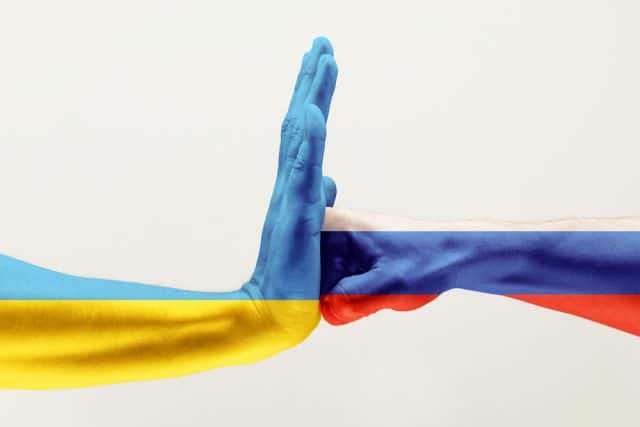How the Ukraine-Russia conflict affects international remote employment

Russia invading Ukraine is just the latest large-scale crisis and source of consternation on the world stage. The effects of a lingering pandemic, decimated economies and the threat of spiraling global war add up to a fraught situation for employees, recruiters, managers and business leaders.
This is a brief look at how the Ukraine-Russia conflict is affecting the stability, availability, culture and safety of international remote employment.
Workforce and Payroll Management
About 40 percent of Russian citizens named remote-work flexibility one of their top job-search criteria in 2021.
Remote work had become similarly important among the Ukrainian workforce -- especially the 200,000 software and app developers based there. Ukraine has been one of Europe’s favorite homes-away-from-home for employers wishing to outsource development tasks.
The pandemic played a significant role in expanding Russia’s remote-work workforce. Unfortunately, recent events complicate bureaucracy and culture.
Expect this ongoing conflict to have a measurable impact on employees, whether they are citizens of the directly affected regions or not. This begins with significant complications to how workers are compensated in each country.
- Russia: The international financial market has isolated Russia through sanctions and devaluations and made it impossible for multinational companies to compensate employees and contractors residing there.
- Ukraine: Sanctions and other organized responses from world leaders compromised and isolated Russia’s economy. Ukraine’s, on the other hand, was brought to an effective standstill by deliberate attacks on its economic infrastructure.
Divestment of Workers
Employers may find themselves forced to place Ukrainian and Russian remote workers on indefinite unpaid leave or close out their contracts. No matter how the war ends up playing out, current events may have a long-term chilling effect on multinational employers taking on either Russian or Ukrainian workers.
As a result of Russia’s economic isolation, multinational employers will likely be left contemplating mass layoffs and disbanding remote teams based in Russia or Ukraine.
Getting Employees to Safety
Under the eyes of the law in the U.K., U.S. and throughout the industrialized world, it is an employer’s responsibility to take every reasonable action to ensure a safe workplace.
War pushes such legal precedents to the extreme. However, employers seem to recognize the moral imperative of repatriating Ukraine-based employees and contractors, native and otherwise, as swiftly as possible to see them out of harm’s way.
Other Changes to the Labor Market
War breaking out between Russia and Ukraine has resulted in one of the largest humanitarian crises in living memory. At least 1 million people have been driven from their homes in Ukraine since the violence started.
It may be difficult to assimilate these citizens into the Europan Union (EU) workforce without revising visa and work-mobility laws. Governments in the U.K. are doing their best to accommodate these refugees by instituting visa waivers and taking other measures. Still, the business community may have to lobby for more expedient changes.
Mental Health Accommodations
Mental health experts observe that remote work may amplify some individuals’ tendencies to experience isolation and depression. Others thrive in such an environment.
Regardless, adding the mental burden of ongoing large-scale armed conflict could be the breaking point for some remote workers. Some employees may have acquaintances or family members stuck in harm’s way, which would seriously jeopardize their mental health and job performance.
Let the latter issue become a secondary concern. Managers and team leaders -- especially those overseeing remote teams -- owe it to their direct reports to make a range of mental health resources available, even if it’s just a sympathetic ear during times of worry.
Lost Economic Opportunities
The EU represented 37 percent of all Russian trade in 2020. Russia has also provided lucrative expansion opportunities for EU companies in virtually every industry. Working-class individuals across multiple continents have enjoyed this productive relationship for generations.
Economists expect growth to slow when it comes to the expansion of European and Western businesses into Russia or adjacent markets due to recently ruptured economic ties.
Automotive, energy, agriculture, financial services, luxury goods and general manufacturing are all bracing themselves to put new projects, acquisitions, expansions and other investments throughout the region on hold. Expect this to cause a further chilling effect on employment in the contested area and beyond.
War Between Russia and Ukraine: The Workforce Fallout
Economists have years’ worth of work in untangling and reckoning with the long-term impacts of this conflict. What’s clear is that the workforce in both countries will likely not be the same for some time.
A new Iron Curtain is springing up between countries that previously enjoyed a tenuous but promising peace. This is a time that calls for solidarity and a welcoming spirit toward all members of the working class -- regardless of national origin and where they work. When political leaders choose war, it’s up to the business community and working individuals to build bridges.
Image credit: [email protected]/depositphotos.com

Devin Partida writes about AI, apps and technology at ReHack.com, where she is Editor-in-Chief.